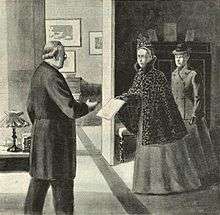Gertrud Adelborg

Gertrud Virginia Adelborg (10 September 1853 in Karlskrona – 25 January 1942) was a Swedish feminist and a leading member of the women's rights movement.
She was the daughter of Captain (naval) and noble Jacob Adelborg and Hedvig af Uhr, and the sister of painter Ottilia Adelborg and textile artist Maria Adelborg. She never married. Adelborg was educated by a governess at home and in girls schools. She worked as a teacher in 1874–79, and was employed at Svea hovrätt 1881–83.
Gertrud Adelborg was active within the Swedish women's movement and the struggle for woman suffrage. She worked for the bureau of the Fredrika Bremer Association or FBF in 1884–1907 (from 1886 as chairperson of the Stockholm bureau) and was a member of the central comity of FBF in 1897–1915. She initiated the FBF:s school for the education of female teachers at Rimforsa, where she belonged to the school board in 1907–21.
In 1899, a delegation from the FBF presented a suggestion of woman suffrage to prime minister Erik Gustaf Boström. The delegation was headed by Agda Montelius, accompanied by Gertrud Adelborg, who had written the demand. This was the first time the Swedish women's movement themselves had officially presented a demand for suffrage.
Gertrud Adelborg was a member of the central comity in the National Association for Women's Suffrage (Landsföreningen för kvinnans politiska rösträtt, LKPR) in 1903-06. In 1907, she headed the LKPR delegation which presented their demand to the monarch Oscar II of Sweden himself. She reminded Oscar II of the reforms regarding women's rights which had been passed by his father Oscar I of Sweden, and continued with expressing her hope that "The son of Oscar I would attach his name to a suggestion of women suffrage".[1] According to Lydia Wahlström: "as soon as the king heard the name of his father, his interest was awoken",[2] and Oscar II promised his support, but added that as a constitutional monarch he could not do much, and that the doubted the present government would. Adelborg's role within the suffrage work was described as important but less public: she took on secretarial tasks, made investigations, structured work and was the author of many of its publications and manifests.
She was given Illis Quorum in 1907.
References
- ↑ Barbro Hedwall (2011). Susanna Eriksson Lundqvist. red.. Vår rättmätiga plats. Om kvinnornas kamp för rösträtt.. (Our Rightful Place. About women's struggle for suffrage) Förlag Bonnier.
- ↑ Barbro Hedwall (2011). Susanna Eriksson Lundqvist. red.. Vår rättmätiga plats. Om kvinnornas kamp för rösträtt.. (Our Rightful Place. About women's struggle for suffrage) Förlag Bonnier.
- Barbro Hedwall (2011). Susanna Eriksson Lundqvist. red.. Vår rättmätiga plats. Om kvinnornas kamp för rösträtt.. (Our Rightful Place. About women's struggle for suffrage) Förlag Bonnier. ISBN 978-91-7424-119-8 (Swedish)
- Walborg Hedberg – Louise Arosenius: Svenska kvinnor från skilda verksamhetsområden, Stockholm 1914, sid. 1.
|